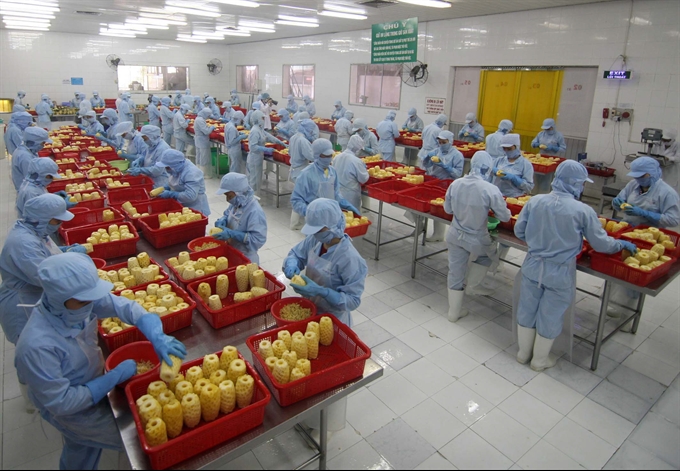 Economy
Economy

Local businesses, managers and economists sat together to discuss how to improve Việt Nam’s position as a trustworthy, reliable and sustainable exporting country at a trade promotion forum in Hà Nội yesterday.
 |
| Agricultural products being processed for export at An Giang Fruits, Vegetables and Foodstuff Joint Stock Company in southern An Giang Province. Việt Nam was seeking measures to become a more reliable and sustainable exporting nation. - VNA/VNS Photo Vũ Sinh |
HÀ NỘI – Local businesses, managers and economists sat together to discuss how to improve Việt Nam’s position as a trustworthy, reliable and sustainable exporting country at a trade promotion forum in Hà Nội yesterday.
This year, the Vietnam Trade Promotion Forum 2016 was designed to exchange and discuss measures on export promotion, production development and market development, aiming to boost the production and exporting capacity of Vietnamese enterprises.
Speaking at the Vietnam Investment Promotion Forum, Deputy Minister of Industry and Trade, Đỗ Thắng Hải, described trade liberalisation as the main momentum of global trade over the past decades, especially in Asian countries, including Việt Nam.
Since joining the World Trade Organisation in 2007, the country’s total trade turnover has increased threefold, from US$111.3 billion to $327.8 billion in 2015. Import revenue expanded 2.6 times and export value climbed 3.3 times to $165.7 billion and $162.4 billion, respectively, he said.
These numbers demonstrate that Vietnamese businesses have made the best use of opportunities afforded by integration and trade liberalisation to deliver their products abroad, the official noted.
However, the integration process has exerted diverse impacts on economic sectors, Hải said, explaining that home décor products, handbags, leather and footwear, garment-textiles and a number of agricultural products have received more benefits than others.
Also, he added, the enterprises which turn out high-quality products and have strong export promotion measures are likely to have better success.
Võ Trí Thành, former Deputy Director of the Central Institute for Economic Management, said small-scale businesses with outdated technologies and weak management will find it hard to compete with their foreign rivals.
Besides this, the domestic market is expected to witness fierce competition as a flurry of foreign products with competitive prices and quality will flood Việt Nam, thanks to the present average import tax reduction of above 10 per cent.
Strict requirements regarding product quality, technology and locally-made content set by foreign countries are the main barriers to local exporters, he said.
Meanwhile, Thành pointed to many domestic enterprises that have yet to take the initiative in studying foreign markets and export promotion.
He suggested that Vietnamese firms improve their production and business capacity while raising their product quality to satisfy standards set by foreign markets.




